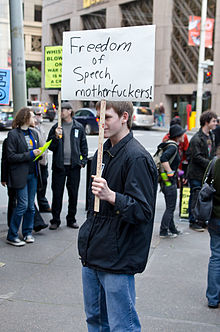Motherfucker

Motherfucker (sometimes abbreviated as mofo, mf, or mf'er) is an American vulgarism. Its literal sense means one who fucks his mother,[citation needed] although this usage is seldom implied. Rather, it refers to a mean, despicable, or vicious person, or any particularly difficult or frustrating situation. Alternatively, it is used as a compliment, for instance in the jazz community. Due to the semiotics, it is less often applied personally to females; a personal direct object referred to as such is usually male.[1]
Variants
Like many widely used offensive terms, motherfucker has a large list of minced oaths. Motherhumper, motherfugger, mother f'er, mothersucker, motherlover, mofo, fothermucker, motherflower, motherkisser and many more are sometimes used in polite company or to avoid censorship.[citation needed] The participle motherfucking is often used as an emphatic, in the same way as the less strong fucking. The verb to motherfuck also exists, although it is less common. Conversely, when paired with an adjective, it can become a term denoting such things as originality and masculinity, as in the related phrase "bad ass mother fucker". Use of the term as a compliment is frequent in the jazz community, as in the compliment Miles Davis paid to his future percussionist Mino Cinelu: "Miles...grabbed his arm and said, 'You're a motherfucker.' Cinelu thanked Miles for the compliment."[2]
Usually the word 'motherfucker' is used as a noun, as in That trig problem was a real motherfucker.
Popular culture
The word appears in George Carlin's Seven Words You Can't Say on Television. In one HBO special, he comments that at one point, someone asked him to remove it, since, as a derivative of the word "fuck", it constituted a duplication.[3] He later added it back, claiming that the bit's rhythm doesn't work without it.[3]
Kurt Vonnegut's classic novel Slaughterhouse-Five has, since its original publication, been challenged in libraries and schools on the grounds that the word is used occasionally by the soldiers in the story. Vonnegut later joked in a speech, published in the collection Fates Worse Than Death, that "Ever since that word was published, way back in 1969, children have been attempting to have intercourse with their mothers. When it will stop no one knows."[4]
The word has become something of a catchphrase for actor Samuel L. Jackson, who frequently utters the word in his movies.[5] His use of the word helped him overcome a lifelong stuttering problem.[6]
Literature
The Compleat Motherfucker: A History of the Mother of All Dirty Words by Jim Dawson[7] is a history of the word in black culture and in American literature, film, comedy and music.
See also
References
- ^ "Dictionary.com – motherfucker". Random House Dictionary. Retrieved February 26, 2012.
- ^ Cole, George (2007). The Last Miles: The Music of Miles Davis, 1980-1991. U of Michigan P. p. 90. ISBN 9780472032600. Retrieved 10 March 2013.
- ^ a b Carlin, George (1978). On Location: George Carlin at Phoenix (DVD). HBO Home Video.
- ^ Vonnegut, Kurt (1992). Fates Worse Than Death. New York: Berkeley Books. p. 76. ISBN 0-425-13406-7.
- ^ Jensen, Jeff (August 4, 2006). "Kicking Asp". Entertainment Weekly. Retrieved June 21, 2010.
{{cite news}}: Italic or bold markup not allowed in:|publisher=(help) - ^ "Samuel L. Jackson Needs Certain Swear Word To Stop His Stutter". Huffington Post. June 5, 2013. Retrieved June 6, 2013.
- ^ Dawson, Jim (2009). The Compleat Motherfucker: A History of the Mother of All Dirty Words. Los Angeles, Calif.: Feral House. ISBN 978-1-932595-41-3.
